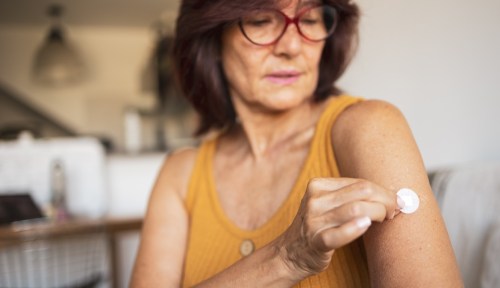Our editors independently select these products. Making a purchase through our links may earn Well+Good a commission
From Increased Jaw Pain to Dry Eyes, These 5 Menopause Symptoms May Come as a Surprise
From increased jaw pain to dry eyes, here are five symptoms of menopause you may not already know about but should.

For the most part, menopause, the natural decline of sex hormones that happens to women most often in their forties and fifties, is thought of in terms of its impact on the reproductive system. But any woman who’s experienced the shift herself will tell you that it’s a total-body transformation that can lead to surprising menopause symptoms, which is something we don’t talk about enough. (The good news is that wearable tracking innovations are contributing to a changed narrative on this front.)
Experts in This Article
board-certified OB/GYN and founder of the Integrative Medical Group of Irvine
But sex hormones—progesterone, estrogen, and testosterone—don’t just control the ovaries. “This link of the so-called sex hormones to all body systems is what is behind the surprising menopause symptoms in organs and structures that are not recognized as being highly regulated by the ovarian hormones,” says Felice Gersh, MD, board-certified OB/GYN, founder of the Integrative Medical Group of Irvine, and the author of Menopause: 50 Things You Need to Know.
Here are five surprising menopause symptoms you may not be aware of but should
1. Jaw pain
Yep, menopause joint pain is a real thing—including the joints in your jaw. “All joints are impacted by hormones, and estrogen is essential for optimal joint lubrication, collagen production, and bone health,” Dr. Gersh says. “Ligaments and tendon health and function are estrogen dependent, and loss of estrogen in menopause causes a deterioration of all joints, including the jaw, which can result in pain and arthritis development.” What’s more, new research indicates that if you suffer from jaw pain and TMJ, you may find symptoms worsen as you go through menopause.
One way to help alleviate or offset this symptom is by eating a rich supply of healthy protein throughout the day—with an emphasis on plant-proteins as a preferred source due to their vast array of essential vitamins and minerals, antioxidants, and fiber. “Antioxidants and polyphenols in foods can help, as well as use of hyaluronic acid and taking collagen, curcumin, Boswellia, omega-3 and CBD,” Dr. Gersh says. Additionally, a holistic wellness practice that includes “acupuncture, heat compresses, and red light therapy can be beneficial,” she adds.
2. Dry eyes
“Estrogen and testosterone have receptors in the glands that produce tears and tear components, and menopause and aging leads to a reduction in the amounts of these hormones and thus results in lowered quantity and quality of tears,” Dr. Gersh explains. “Using over the counter liquid tears and eye drops can help, as well as working with an ophthalmologist for treatment and using prescription eye drops, if necessary.” A humidifier may also provide some relief, especially if the air is very dry in your home.
3. Heart palpitations
“At least a quarter of menopausal women develop heart palpitations,” Dr. Gersh says. “Usually palpitations are not serious, but rarely they can progress to a more serious condition that’s known as atrial fibrillation.”
Heart palpitations occur due to the drop in estrogen production. “Estrogen helps to regulate heart rate and rhythm, and without ovarian estrogen, the autonomic nervous system becomes imbalanced, which results in over-stimulation of the sympathetic nerves to the heart and heart palpitations,” Dr. Gersh explains.
According to Dr. Gersh, treatment includes hormone therapy, mind-body medicine, and other holistic wellness techniques for preventing chronic stress and anxiety, magnesium supplementation, and use of certain pharmaceuticals, such as beta blockers, which may provide relief in mitigating symptoms.
4. Change in body odor
“Bacteria metabolize sweat to create distinctive odors, and so after menopause, bacteria change on the skin, and these different bacteria can lead to different scents being produced,” Dr. Gersh explains. “Use of a gentle body wash may help, as well as moisturizers, such as those containing shea butter, as well as other kinds of soothing essential oils,” says Dr. Gersh.
5. Increased mood swings
“The brain has receptors for estrogen throughout all regions, and estrogen is a key player in the maintenance of serotonin neurons and oxytocin—serotonin is a neurotransmitter involved in the ability to feel calm and happy, while oxytocin promotes feelings of love and bonding,” Dr. Gersh explains.
Reduction in these happiness-boosting hormones due to lower levels of estrogen leads to greater incidence of mood swings and heightened anxiety and depression, as is found in many women going through menopause.
You may treat mood swings by taking estrogen and progesterone, which can be helpful, as well as with a course of antidepressants or tranquilizing medications, suggests Dr. Gersh. Holistic wellness techniques and therapeutic rituals can also help to stabilize mood swings, improve happiness levels, and promote self-love and healing, too. These include regular massages, which can boost serotonin levels, meditation, and physical activity.
Sign Up for Our Daily Newsletter
Get all the latest in wellness, trends, food, fitness, beauty, and more delivered right to your inbox.
Got it, you've been added to our email list.










